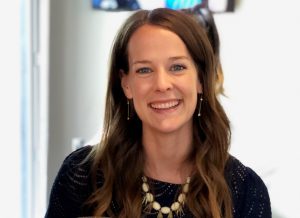
We interviewed school psychology alumni Amanda Hensgen about her path to the Department of Educational Psychology at the University of Minnesota and what she would like prospective students to know.
How did your path lead to the Department of Educational Psychology and your particular major?
I attended my undergraduate at UW-Madison and majored in psychology. I knew I wanted to pursue further education to be able to practice in the field of psychology. As the daughter of two teachers, I grew up valuing public education. I have also always loved working with children, so I was interested in exploring a career that combined psychology, children, and schools. As a senior in undergraduate, I asked if I could take the Introduction to School Psychology graduate course at UW-Madison. In that class, I learned about the profession of school psychology and had the opportunity to shadow a school psychologist. That course solidified my desire to apply to school psychology graduate programs and pursue a career as a school psychologist.
What is most exciting about your work?
This is my seventh year as school psychologist in Minneapolis Public Schools, including my internship. I have had the opportunity to work in a variety of schools during this time ranging from Early Childhood Special Education (ECSE)/Early Intervention (EI) services, elementary and middle school, and even a brief stint in a high school. I have been in a Pre K-8th grade building for the last three years and serve as the full-time Multi-Tiered Systems of Support (MTSS) coordinator. Having the opportunity to engage in systems change work full time has been the most rewarding role. I consult and collaborate with educators daily about the use of evidence-based instructional practices and supports. Aside from my work coordinating MTSS, I enjoy all my direct interactions with students. I particularly enjoy working with students with emotional and behavioral disorders and have found an unexpected joy for middle school students over the past few years. Additionally, anytime I have the opportunity to work with families is particularly fulfilling. I found my work in ECSE/EI services to be a wonderful opportunity to collaborate directly with families in their homes and to provide needed early intervention services to support children before they even enter school.
What has been most challenging?
I have experienced many challenges over the years as a school psychologist in an urban public school system. Although my experiences have overwhelmingly been positive, it is challenging to be a part of an educational system that does not serve the needs of all students. The opportunity gaps remain large and many educational practices such as exclusionary discipline and special education eligibility disproportionately affect our BIPOC students. Many current educational policies perpetuate these inequities. I believe our educational systems need to adapt so all students are successful and achieve.
Additionally, I was underprepared to see how large the research to practice gap really is in schools. Many instructional practices within schools lack strong evidence and effectiveness. It has taken years of energy and time to advocate for the importance of having strong equity-focused Multi-Tiered Systems of Support (MTSS) and to build these systems. Systems change is a slow process and truly requires the strong understanding and support of district and school leadership.
How did your professors help you along the way?
I learned a tremendous amount from my professors in my coursework. They supported me when I was interested in pursuing additional practicum experiences in Early Childhood Special Education (ECSE). Most memorably, multiple professors provided me invaluable support as I undertook the most challenging endeavor of graduate school: completing my master’s thesis.
What would you like prospective students to know?
When researching graduate program in school psychology, it is important to consider the range of both research and practicum experiences offered. The majority of students in my cohort were doctoral candidates, who focused on research experience, whereas my priority was to gain practical experience in various school settings. Fortunately, I was able to gain both experiences through my graduate research assistantship and multiple practicum in schools. It is important to pursue and advocate for these interests as a graduate student, as that is your time to explore these interests. It is also wise to look into the availability of graduate research assistantships that provide tuition reimbursement.
How did your cohort help you along the way?
My cohort was a huge part of what made the graduate program positive. My colleagues were bright and brought a range of unique perspectives and experiences to the program. We challenged and supported one another – and had a lot of fun! We spent countless time together studying, researching, writing, and collaborating on projects. Many of us shared practicum experiences and graduate research assistantships together. It has been wonderful to see where our careers have taken us from practitioners to researchers to professors.
Why did you choose the school psychology program at the University of Minnesota?
When researching graduate programs back in 2011, the University of Minnesota consistently came up as one of the best programs to study school psychology in the country. I looked into several other programs, but kept coming back to this one for the range of experiences offered for graduate students and faculty research interests that aligned with mine. I ended up only applying to the University of Minnesota’s school psychology program. When I came for interview day, it was my first time ever even visiting Minneapolis. I remember Dr. Burns calling shortly after interview day to offer me a spot in the graduate program and I was thrilled!



